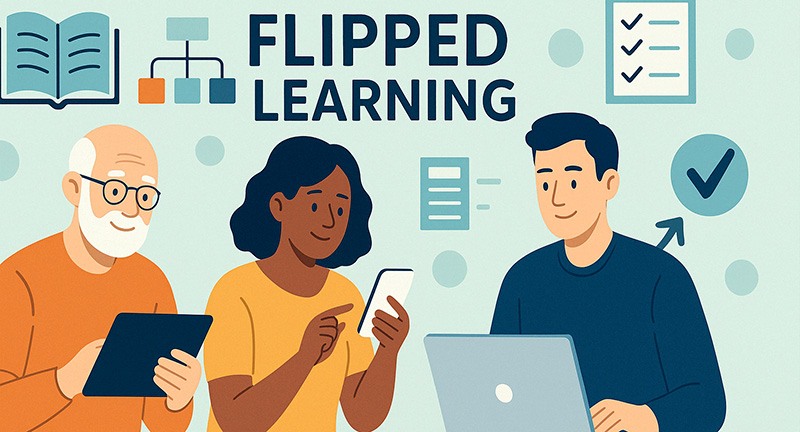
Introduction to Flipped Learning 3.0 – Empowering Adult Learners
Welcome to the Flipped Learning 3.0 training! This course is designed to equip you with the knowledge and practical strategies to effectively implement and enhance flipped learning methodologies within adult education contexts. Building upon the foundational principles of flipped learning, Flipped Learning 3.0 emphasizes more profound learning, active engagement, personalized pathways, and the strategic use of technology to empower adult learners. We’ll explore how to move beyond simply assigning pre-class videos to creating dynamic and interactive learning experiences that maximize valuable in-class time for collaboration, problem-solving, and the application of knowledge. Get ready to transform your teaching and create more impactful learning environments for your adult students!
Course Structure
Module 1: Understanding the Evolution of Flipped Learning (Estimated Time: 1.5 - 2 hours)
- Introduction and Welcome: Setting the stage, course objectives, and introductions among participants.
- A Brief History of Flipped Learning: From its origins to the core principles.
- The Shift to Flipped Learning 3.0: Exploring the key advancements and distinguishing characteristics (e.g., emphasis on deeper learning, learner agency, mastery-based approaches).
- Why Flipped Learning Resonates with Adult Learners: Connecting the methodology to adult learning principles (Andragogy) such as self-direction, experience-based learning, and relevance.
Module 2: Designing Engaging Pre-Class Activities for Adults (Estimated Time: 2 - 2.5 hours)
- Curating and Creating Effective Pre-Class Content: Strategies for selecting, adapting, and creating engaging videos, readings, podcasts, and interactive modules tailored for adult attention spans and learning preferences.
- Designing for Active Viewing and Engagement: Techniques to encourage learners to interact with pre-class materials (e.g., embedded questions, note-taking guides, short quizzes).
- Leveraging Technology Tools: Exploring various platforms and applications for content delivery and tracking engagement (e.g., LMS features, video platforms with analytics).
- Accessibility and Inclusivity: Considerations for diverse adult learners and ensuring equitable access to pre-class materials.
Module 3: Transforming In-Class Time for Deeper Learning (Estimated Time: 2.5 - 3 hours)
- Moving Beyond Lectures: Exploring a range of active learning strategies suitable for adult learners (e.g., case studies, problem-based learning, group discussions, debates, simulations, peer teaching).
- Facilitating Meaningful Collaboration: Designing activities that encourage knowledge sharing, diverse perspectives, and the building of learning communities among adults.
- Providing Timely and Relevant Feedback: Strategies for formative assessment and feedback during in-class activities.
- Addressing Individual Needs and Learning Styles: Utilizing differentiated instruction and flexible grouping within the flipped classroom.
Module 4: Implementing Assessment and Providing Personalized Learning Pathways (Estimated Time: 2 - 2.5 hours)
- Aligning Assessment with Flipped Learning Goals: Designing formative and summative assessments that measure deeper understanding and application of knowledge.
- Leveraging Technology for Assessment: Exploring online quizzes, peer assessment tools, and e-portfolios.
- Creating Personalized Learning Pathways: Utilizing pre-class assessments and in-class observations to tailor learning experiences to individual adult learner needs and goals.
- Incorporating Learner Choice and Agency: Empowering adults to take ownership of their learning through flexible assignments and self-directed activities.
Module 5: Overcoming Challenges and Sustaining Flipped Learning 3.0 (Estimated Time: 1.5 - 2 hours)
- Addressing Common Challenges in Implementing Flipped Learning with Adults: (e.g., technology access, learner buy-in, time management).
- Strategies for Gaining Learner Buy-in and Providing Support: Communicating the benefits of flipped learning and offering necessary resources.
- Evaluating the Effectiveness of Flipped Learning Initiatives: Gathering feedback and measuring impact on adult learner outcomes.
- Planning for Sustainability and Continuous Improvement: Developing strategies for ongoing reflection and refinement of flipped learning practices.

